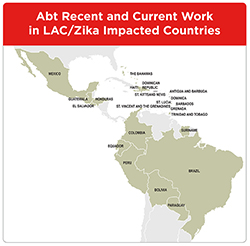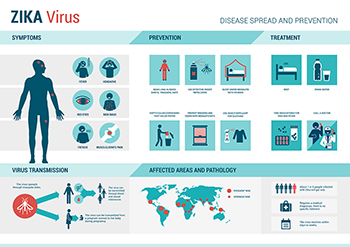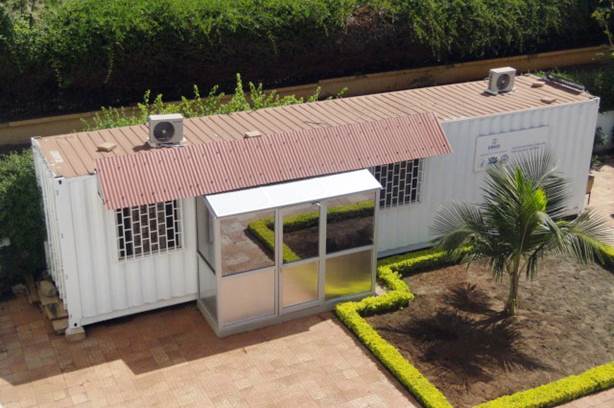Mobilizing Against Zika
Abt’s Relevant Capabilities for Zika:
Community Mobilization- IRS
- SBCC
- Pandemic preparedness
- Family Planning/Reproductive Health
- Community mobilization
- Strengthen laboratory and surveillance
- Implement surveillance
- Developing multi-site research network platforms
- Entomological monitoring
- Insecticide resistance monitoring
- Vector abundance and behavior
- Insectary-in-a-box
- Build capacity for frontline workers
- Use technology to improve communication among health workers and data flow
- Private sector partnership
- Supply chain management
- Capacity Building
- Technology
Abt has long history of working in the U.S. and abroad to build the capacity of health care workers to address the challenges of pandemic diseases, including conducting state-of-the-art surveillance; quickly moving from research to application; and using technology to make data collection and analysis smarter and faster. And Abt’s climate change experts are advising many entities on risks and adaptation strategies for our changing climate – a growing factor in disease transmission.
Our staff includes epidemiologists, economists, public health practitioners, climate scientists, and communications and technology experts.
Deep Expertise and Experience in LAC
Abt has worked in many countries in Latin America and the Caribbean, and our knowledge of the language, health systems and culture is combined with deep expertise in:- Community-based education and mobilization
- Social behavior change communications (SBCC)
- Translational guidance
- Community-based surveillance
- Rapid-cycle research to action
- GIS mapping
- Capacity building
- Case management
- Health systems strengthening
- Vector control
- Entomological monitoring
- Private sector engagement
- Family planning and reproductive health
- Malaria in pregnancy
Available Vehicles
Abt’s 51 years of working with partners to deliver effective, data-driven responses to a wide array of health challenges is recognized worldwide, as is our ability to get up to speed smartly and quickly.We hold the following procurement vehicles:
- MOBIS
- TASC 4
- HFG
- SHOPS PLUS
- HHS Program Support Contract (PSC)
- Professional Services Schedule (GSA)
- CDC Advancing Public Health Impact through Policy (APHIP) IDIQ Domain 1 – Policy Analysis
- CDC Blanket Purchase Agreement (BPA) for Advancing Public Health Impact through Research (APHIR)
- CDC Comprehensive Technical, Scientific, Research and Public Health Support for the National Center on Birth Defects and Developmental Disabilities (NCBDDD TAMS)
- CDC Global Data and Technical Assistance (GDATA) Blanket Purchase Agreement
- CDC Health Marketing (HM) Blanket Purchase Agreement
- CDC Safety and Healthcare Epidemiology Prevention Research IDIQ
- CDC Surveys Fit for Purpose: Monitoring and Evaluating the Nation’s Public Health and Prevention Programs Blanket Purchase Agreement

Abt Recent and Current Work in LAC/Zika Impacted Countries (Click image to view full size)
Meeting Global Health Threats: The Abt Advantage
Preventing Infectious Disease
Abt has designed and implemented a wide array of education and protection campaigns for vulnerable populations, reducing the risk of contracting an infectious disease such as Zika. Relevant activities include:For more information on working with Abt to respond to the global health challenge of the Zika virus, please contact Diana Silimperi, M.D., Division Vice President, International Health and/or Chris Spera, Ph.D., Division Vice President, U.S. Health.
- Monitoring the Influenza Pandemic: In an influenza pandemic, the Centers for Disease Control and Prevention (CDC) needs trustworthy data–quickly. Abt has years of experience conducting rigorous large-scale epidemiologic studies including flu-monitoring surveys for CDC. Abt smartly uses technology to expedite results from twice-a-year surveys of health care personnel and the high-risk population of pregnant women.
- Spraying to Protect from Mosquitos: Abt leads Indoor Residual Spraying (IRS) projects that protect millions of people from malaria in the short term and build capacity of ministries of health, national malaria control programs, health facilities, NGOs, and community and business leaders in the long term. We manage IRS operations and logistics in 11 countries where malaria is endemic and provide enhanced entomological monitoring in 17 target countries. Abt also carries out communications campaigns to educate community members about malaria and the benefits of IRS.
Implementing Complex, Responsive Surveillance Systems

Zika Symptoms, Transmission, Prevention, and Treatment (Click image to view full size) Abt has established a variety of complex surveillance systems to respond to threats similar in scope to that of Zika. Examples include:
- Mapping Resources: Through the SHOPS project, Abt conducted a comprehensive mapping of private sector resources for health in Antigua and Barbuda, Dominica, St. Kitts and Nevis, and St. Vincent and the Grenadines. Each mapping generated a national database of private health care providers with information on their location and the services they provide.
- Customizing GIS for Yemen: Abt’s Health Systems 20/20 project developed a GIS-enabled health information systems and mapping tools to support Yemen’s government. The customized GIS application utilizes scalable tools tailored to meet local, district, governorate, and national needs.
- Designing a Case-Control for Influenza Prevention: In collaboration with the CDC, Abt used a case-control design to evaluate the effectiveness of seasonal and 2009 H1N1 vaccine in preventing laboratory-confirmed influenza infection associated with admission to an intensive care unit (ICU) among children aged 6 months to 17 years during the 2010-2011 influenza season.
- Piloting a Community-Based Detection Model: In Lao PDR, the “Avian Influenza (AI) Mekong Initiative” focused on piloting innovative approaches to build capacity to prevent and control Avian Influenza (AI) through a community-based surveillance model, which rapidly detects and responds to unusual health events in humans and animals that may signal AI or other priority infectious diseases such as measles and neonatal tetanus.

Insectaries-in-a-box Innovation: In Angola, Liberia and Mali, insectaries (infrastructure for rearing and keeping mosquitoes) were lacking. Abt’s PMI AIRS Project took innovative measures to overcome this challenge, converting 40-foot shipping containers into functional insectaries (Insectary-in-a-Box). These insectaries provide an optimal environment for rearing and keeping mosquitoes; testing and identification; and dissecting and preserving mosquitoes for further analysis.
Controlling Mosquito-Borne Viruses
The prevention or reduction of transmission of vector borne diseases is dependent on the control of mosquito vectors and limiting person-mosquito contact. Mosquito surveillance is therefore critical to any local integrated vector control program.The PMI AIRS project develops and distributes standard entomological data collection tools for each of the 17 countries in which it works. The data collection covers all mosquito sampling methods used in the project as well as standard mosquito testing methods. PMI AIRS developed an entomological database for two important indicators: insecticide resistance and cone bioassay tests.
Managing and Diagnosing Cases
Abt is helping governments develop health policies, guidelines, manuals, and supervision strategies for case management applicable to what needs to be done for Zika:- Training Partnership: Abt partnered with Mali’s National Malaria Control Program (NMCP) and other stakeholders to conduct health provider training of trainers on new malaria case management guidelines. The project trained 341 trainers and 1,837 qualified reference and community center health providers in facility based case management of malaria.
- Case Detection: Abt provided technical assistance in Azerbaijan to strengthen the ability of the existing infectious disease reporting system to detect and report suspected human cases of AI. We developed and adopted a standard case definition for use in detecting and reporting cases of “influenza-like illness;” developed diagnostic and reporting forms and protocols; and trained district clinical and surveillance staff in the use of the procedures and protocols.
Focus Areas
